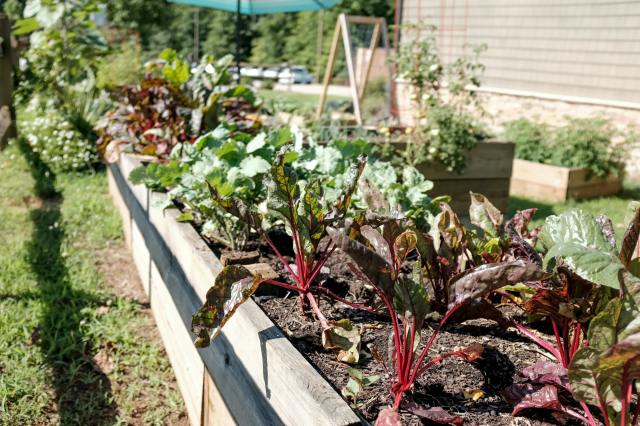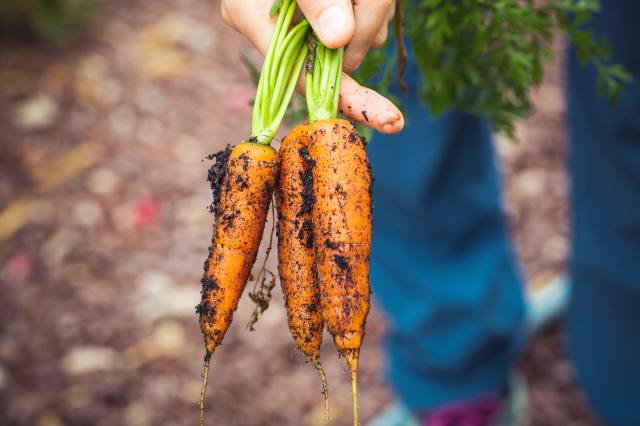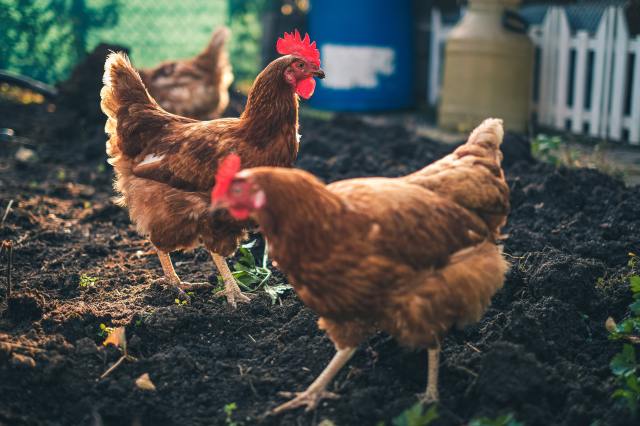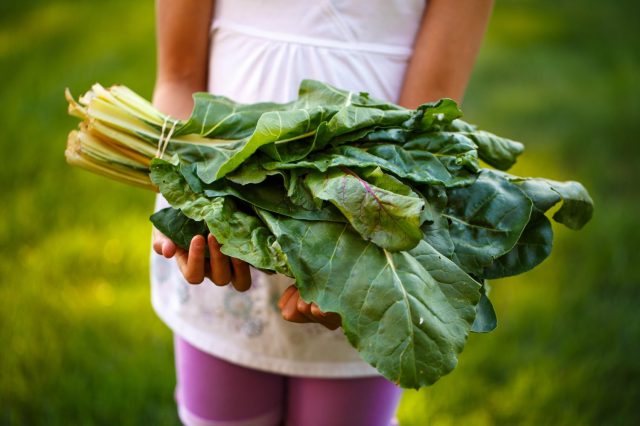Portlanders love the outdoors and animals, and with COVID keeping us close to home many families have considered growing and raising animals and plants for fun, hope, and sustenance. New to gardening and want to grow fresh food for your family this summer? Here’s our handy guide to getting your very own urban farm up and running. Read on for all the details on digging in!

Choose your garden location
You don’t need a ton of space to grow a lot of food! Even a sunny balcony or patio can yield a surprising amount. Be sure to choose a location that allows for maximum sun, but a little shade during part of the day is nice during the summer months, to keep tender veggies from burning. For minimal to no outdoor space, try a kitchen herb box on a windowsill, or contact Portland Parks & Recreation to find out about a low-cost community garden plot in one of more than 30 community gardens all over the city. Have a little more space? Container gardening is a great choice for balconies, patios, rentals, and small spaces. If you have room for a raised bed, there are resources for building a simple box of your own, and Portland Edible Gardens will even build one for you! Maximize space by choosing unused areas like parking strips and grassy medians between driveways. A water-hogging lawn can be transformed into an in-ground garden with a little effort, yielding big results.
Prepare the Soil
Good food grows from the soil up! If you want to feed yourself well, you need to feed the soil first. Portland Nursery has a wealth of information available on their website to help you determine soil health. Metro Master Gardeners, of the OSU Master Garden Extension program, can also help, including soil test kits to figure out the presence of lead and other potentially harmful toxins. Smaller container gardens and raised beds can be topped with bagged potting soil available at local nurseries. For larger raised beds and in-ground gardens, local topsoil options for delivery and pickup include Foster Fuel and Deans. For a slower burn, try lasagne-style sheet mulching to suppress grass and weeds. Layer cardboard, manure, and straw directly over the grass, and wait a month or two to harness the power of earthworms and microbes to turn it all into fertile soil. You can add a layer of topsoil before planting.
Make a Plan
For small raised beds, Square Foot Gardening is a great beginner method with gratifying high-yield results. Choose from dozens of books on the method or browse the official website for resources, including affordable online courses from certified instructors. The OSU Extension program has a short guide on raised bed planting as well. No matter what method you choose, draw a sketch of your garden and mark out what plants you plan to grow. Different plants have different germination-to-harvest rates, meaning you can grow quick-growing veggies like radishes in between rows of slower-growing carrots. You'll also want to think about how much space each plant will require. A sketch will help you estimate space requirements, as well as think ahead to fall and winter crops. Check out Portland Nursery's handy planting calendar for fruits and veggies to learn more. Keep your sketches in a designated folder or notebook so you can refer back to it later. For multiple beds and single beds alike, succession planting will help you rotate your crops and reduce pest pressure in future seasons. Take advantage of online instructional videos like the ones at Portland Edible Gardens.

Decide on Irrigation
Before you get your plants in the ground, it's a good idea to think about how you'll water them. Hand-watering with a hose, bucket, or watering can is the simplest choice, appropriate for containers and single raised beds. For multiple raised beds and larger areas, consider a soaker hose that you can wind through plants. Connect one end to your hose and let it irrigate plants while you weed or harvest. Raised bed irrigation kits take automated watering to the next level. Add a timer to take the guesswork out of it. For in-ground gardens, you can purchase irrigation supplies in bulk for more savings.
Plant
Now the fun part! Get those plants in the ground! You can purchase starts (young plants in small containers) for most vegetables, but some plants do better from seed, like carrots and radishes, because they don't like to be moved. You may choose to plant certain things from seed to save money, or experience the magic of watching a plant grow. Consider your timing as well. If you're just getting started in June, for example, you may want to pick up larger tomato starts to ensure you get to eat those tasty ripe fruits before summer wanes. Lay out your plant starts (or draw lines in the soil if planting seeds), following package directions for spacing and seed depth. If you need extra guidance on planting or any of the steps above, Growing Gardens offers virtual consulting to meet your level of experience.
Tend and Harvest
For best results, keep soil loose, moist, and weed-free throughout the growing season. Read up on individual crop preferences. Potatoes, for example, need to dry out at a certain point to keep tubers from rotting underground. Alliums like garlic and onions have similar needs. Plan ahead so you can easily block water to those crops while watering others, using goof plugs on irrigation lines. Watch for pest pressure and consult local experts if you're having trouble defending crops against slugs, caterpillars, or other pests. Many organic methods exist to preserve your harvest while respecting Mother Nature! The Master Gardeners at OSU Extension Programs have a well-established Ask an Expert process for fielding your questions about pest control and many other gardening solutions.

Chickens and Ducks
For even more of an urban farm experience, consider hosting your own flock! Portland allows for up to three backyard chickens or ducks without a permit, but roosters are prohibited. Buy chicks, pullets, and ducklings from established nurseries and hatcheries, who do their best to send you home with female birds. (Most offer a 90% sexing guarantee.) Due to recent high demand, you'll want to call ahead or email to join waiting lists. Naomi's Organic Farm Supply is nearing the end of their chick orders, but check the website for updates. They're also a great resource for hen and duck supplies! In Portland and Gresham, Burns Feed Store offers chicks from February through mid-August, and Woodburn's Pete's Hatchery will even mail your chicks to you!
Fun Projects with Kids
To get your child interested in gardening, read Lois Ehlert's Planting a Rainbow, then plant a rainbow garden together. Choose a mix of vegetables and flowers in every color. Try red tomatoes, orange marigolds, yellow sunflowers, "Green Envy" zinnias (or any leafy green), blue bachelor's buttons, and purple kale. Planning and planting a pizza garden is another fun way to get kids invested in tending crops from seed to table. Or build a fun structure like a sunflower house and let kids sit under the impressive canopy come high summer.

Local Shops and Resources
The Portland Metro area is filled with nurseries, farm supply stores, and nonprofits ready to help you get growing. They're working hard during the pandemic to keep customers safe and supplied. So return the favor and buy local whenever possible! With a little planning and some patience, you can get everything you need locally to grow a great garden this year.
OSU Extension Master Gardener Program
Visit the website for your local extension office, and for more information on online events including free or low-cost classes in veggie gardening.
Online: extension.oregonstate.edu
Growing Gardens
3114 SE 50th Ave.
503-284-8420
info@growing-gardens.org
Online: growing-gardens.org
Portland Edible Gardens
503-893-9312
info@portlandediblegardens.com
Online: portlandediblegardens.com
Naomi's Organic Farm Supply
3454 SE Powell Blvd.
order@naomisorganic.com
Online: naomisorganic.blogspot.com
Coronavirus specifics: The shop is closed to the public, but open for online orders. Email your order on any day except Tuesdays and Wednesdays, when staff closes orders. Emails sent after 5 pm Monday and before opening on Thursday will be deleted. This is to stay on top of orders!
Portland Nursery
5050 SE Stark St.
503-231-5050
9000 SE Division St.
503-788-9000
Online: portlandnursery.com
Tony's Garden Center
10300 SE Holgate Blvd
503-760-7718
Online: tonysgarden.com
Coronavirus specifics: Store is open to the public. Wear a mask and observe social distancing guidelines. Taped markers throughout the nursery show appropriate distancing when waiting in line or browsing. Open Daily 9 a.m.-6 p.m.
Garden Fever
3433 NE 24th Ave.
info@gardenfever.com
Online: gardenfever.com
Coronavirus specifics: Open for paid order pickup Wednesday-Saturday, 10 a.m.-5 p.m. Download and attach order forms online, and email. Staff will call to collect payment and explain pickup.
Burns Feed Store
29215 SE Orient Drive
Gresham, OR 97080
503-663-3246
Online: burnsfeed.com
Pete's Hatchery
13148 NE Portland Rd.
Gervais OR 97026
844-307-4777
Online: peteshatchery.com
Mt. Scott Fuel (soil)
6904 SE Foster Rd.
503-774-3241
Online: mtscottfuel.com
Deans Residential (soil)
6400 SE 101st Ave.
503-281-1637
Online: fineroutdoorliving.com
Wichita Feed and Hardware
6089 SE Johnson Creek Blvd.
503-775-6767
Online: wichitafeedandhardware.com
RELATED STORIES
7 Local Restaurants Offering Takeout & Delivery Right Now
Buy Local: Curbside Pick-Up & Delivery from These PDX Spots
Kick Cabin Fever with These Odd Roadside Stops Near Portland
Need some fresh ideas?
Subscribe to our weekly newsletter for expert parenting tips and simple solutions that make life instantly better.
By subscribing you agree to Tinybeans Terms and Privacy Policy










